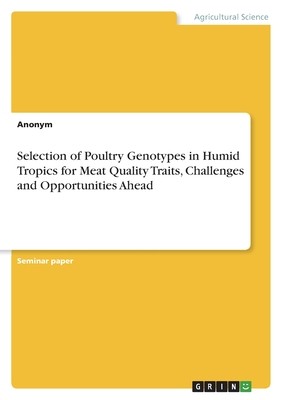
- We will send in 10–14 business days.
- Author: Anonym
- Publisher: GRIN Verlag
- Year: 2021
- Pages: 24
- ISBN-10: 334638635X
- ISBN-13: 9783346386359
- Format: 14.8 x 21 x 0.2 cm, minkšti viršeliai
- Language: English
- SAVE -10% with code: EXTRA
Selection of Poultry Genotypes in Humid Tropics for Meat Quality Traits, Challenges and Opportunities Ahead (e-book) (used book) | bookbook.eu
Reviews
Description
Seminar paper from the year 2018 in the subject Agrarian Studies, grade: 1, Hawassa University, course: Animal Breeding, language: English, abstract: The objective of this paper is to review selection of poultry genotypes in humid tropics for meat quality traits, the challenges, and opportunities including selection of poultry genotypes, breeds of broilers kept by the farmers, selection criteria, and trait preference for meat quality in humid tropics. The indigenous village chicken is the most prominent class of livestock in the country and constitutes about 60-80% of the total poultry population, their productivity levels are low because of low genetic potential and poor nutrition. To overcome the problem of low productivity in local chickens, high-yielding exotic breeds have been introduced through cockerel exchange program by the government. This intervention is bedeviled with many challenges; prominent among them is the birds' inability to adapt to the humid and hot environment, resulting in reduced feed intake and retarded growth. A number of major heat-tolerant genes or gene complexes like naked-neck, ptylopody, polydactyly and frizzle have been identified in the genome of Ghanaian local chicken populations. These unique genes have been reported to ameliorate tropical heat stress and enhance the performance of chickens under hot and humid environments. The existence of the naked-neck gene results in 20-30% less feather coverage overall, with the lower neck of the bird appearing almost naked while the frizzle gene but is reported to reduce the insulating properties of the feather cover (reduce featherweight) and make it easier for the bird to radiate heat from the body.
EXTRA 10 % discount with code: EXTRA
The promotion ends in 21d.03:53:44
The discount code is valid when purchasing from 10 €. Discounts do not stack.
- Author: Anonym
- Publisher: GRIN Verlag
- Year: 2021
- Pages: 24
- ISBN-10: 334638635X
- ISBN-13: 9783346386359
- Format: 14.8 x 21 x 0.2 cm, minkšti viršeliai
- Language: English English
Seminar paper from the year 2018 in the subject Agrarian Studies, grade: 1, Hawassa University, course: Animal Breeding, language: English, abstract: The objective of this paper is to review selection of poultry genotypes in humid tropics for meat quality traits, the challenges, and opportunities including selection of poultry genotypes, breeds of broilers kept by the farmers, selection criteria, and trait preference for meat quality in humid tropics. The indigenous village chicken is the most prominent class of livestock in the country and constitutes about 60-80% of the total poultry population, their productivity levels are low because of low genetic potential and poor nutrition. To overcome the problem of low productivity in local chickens, high-yielding exotic breeds have been introduced through cockerel exchange program by the government. This intervention is bedeviled with many challenges; prominent among them is the birds' inability to adapt to the humid and hot environment, resulting in reduced feed intake and retarded growth. A number of major heat-tolerant genes or gene complexes like naked-neck, ptylopody, polydactyly and frizzle have been identified in the genome of Ghanaian local chicken populations. These unique genes have been reported to ameliorate tropical heat stress and enhance the performance of chickens under hot and humid environments. The existence of the naked-neck gene results in 20-30% less feather coverage overall, with the lower neck of the bird appearing almost naked while the frizzle gene but is reported to reduce the insulating properties of the feather cover (reduce featherweight) and make it easier for the bird to radiate heat from the body.


Reviews